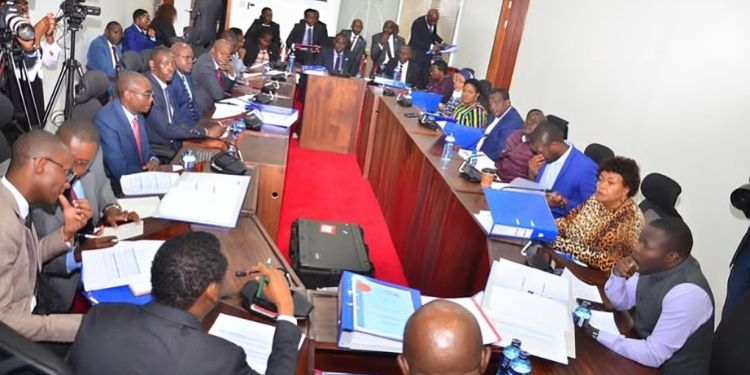Nairobi Governor Johnson Sakaja has defended his administration’s resolution to allocate Ksh9.2 billion within the 2024/25 funds to deal with water provide challenges within the capital.
Appearing earlier than the Senate County Public Investments and Special Funds Committee on Tuesday, July 22, Sakaja responded to audit findings indicating that 51 per cent of water produced by the Nairobi Water and Sewerage Company (NWSC), valued at Sh8.6 billion, is misplaced via the distribution system.
The committee, chaired by Senator Godfrey Osotsi (Vihiga), sought readability on the huge water losses and questioned the effectiveness of Nairobi’s water administration programs.
“Governor, auditors say 51 per cent of water produced price Sh8.6 billion merely vanished. How will we clarify this to ratepayers?” Osotsi requested.
Table of Contents
Infrastructure Blamed for Water Losses
Sakaja attributed the water losses to outdated infrastructure and deferred capital investments.
He defined that the county inherited an ageing water system with worn-out pipelines and malfunctioning meters.
“We inherited antiquated pipes and deferred capital works. We have now ring-fenced Ksh9.2 billion within the 2024/25 funds for meter sealing, leak detection and pipeline rehabilitation, plus AFD and FD tasks already underway,” Sakaja defined.
The Ksh9.2 billion allocation, he stated, will fund leak detection, pipeline rehabilitation, meter sealing, and ongoing tasks supported by the African Development Fund and the French Development Agency.
Sh11 Billion in Receivables Under Scrutiny
The senators additionally pressed Sakaja on Ksh11 billion in unpaid receivables, a few of which have remained excellent for over 480 days.
Nairobi Senator Edwin Sifuna demanded a concrete plan for debt restoration.
“Ksh11 billion sits in receivables over 480 days. Demand letters alone gained’t minimize it. Where is the restoration plan?” he requested.
In his response, Sakaja stated his administration had created two new income areas and launched a Geographic Information System (GIS)-enabled billing platform in February to enhance accuracy in billing and collections.
He additional revealed that authorized groups at the moment are dealing with all circumstances involving money owed above Ksh1 million, and that 1,938 lively however beforehand unbilled accounts have been invoiced.
Wage Bill Concerns and Cost-Cutting Measures
Another challenge raised throughout the session was the excessive employees price, with Senator Eddy Oketch noting that 65 per cent of the corporate’s income is spent on salaries, nearly double the permitted 35 per cent threshold.
Sakaja acknowledged the priority and outlined cost-cutting measures, together with a freeze on non-essential hiring, decentralisation of providers to scale back time beyond regulation, and a cost-recovery tariff proposal submitted to the Water Services Regulatory Board (WASREB).
He expressed confidence that the wage-to-revenue ratio will drop to 45 per cent inside a 12 months if the measures are applied successfully.
The Senate committee is predicted to compile a report with suggestions after reviewing Sakaja’s submissions and audit findings.













